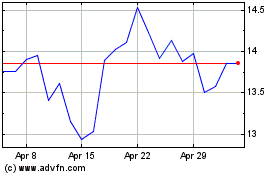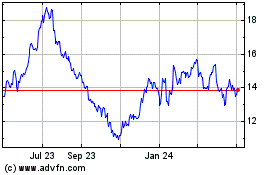By Alison Sider
Airlines detailed the growing impact of the coronavirus by
cutting more flights in domestic and international markets, parking
planes, freezing hiring and reducing executive pay.
American Airlines Group Inc. and Delta Air Lines Inc. joined
United Airlines Holdings Inc. on Tuesday in slashing the number of
flights across their networks, with some cuts extending through the
summer, as cancellations overtake new bookings in some markets
because of passenger fears about traveling.
The virus's rapid impact on demand has sent airlines reeling.
Most carriers in the U.S. have withdrawn their financial guidance
for the year and suspended share buyback programs, among other
measures. Airlines are now preparing for the prospect that recovery
could take months, rather than the quick bounceback many had
initially anticipated.
"This is a fear event," Delta CEO Ed Bastian said Tuesday at an
industry conference that was webcast, rather than being held live.
He said he expects demand will continue to erode in the near
term.
To cope, Delta will park some planes, cut international capacity
as much as 25% and domestic capacity as much as 15%, and also defer
$500 million in capital expenditures. It may consider retiring some
planes early.
American said it plans to cut domestic flying by 7.5% by
decreasing frequencies in markets where it operates many flights.
It will reduce international flying by 10% for the summer peak
travel season.
Airline shares have fallen more than 30% in the past two weeks,
but they rose sharply Tuesday afternoon after carriers outlined
planned cuts and cash-raising options. American shares gained 16%,
United's rose 15% and Delta shares were up 4%.
President Donald Trump said Tuesday that the administration
plans to offer assistance to the airline and cruise industries. He
didn't offer details. Industry leaders who met with the president
at the White House last week said they hadn't sought aid. "Not one
CEO asked for government financial relief," said Doug Parker,
American's chief executive.
To reduce costs, airlines have frozen hiring and have started
offering voluntary unpaid leave to employees. United CEO Oscar
Munoz and President Sco said they would forgo their base salaries
until at least June 30. Southwest Airlines Co. CEO Gary Kelly is
taking a 10% pay cut. American's Mr. Parker has been paid only in
stock since 2015.
Overseas, the European Commission said it would propose
legislation to suspend airport-slot rules, allowing airlines to cut
back capacity without risking the loss of lucrative takeoff and
landing rights. The rule changes, disclosed Tuesday, could provide
significant relief for domestic and international carriers
operating in Europe. Some have been flying near-empty flights in
and out of congested hubs, like London's Heathrow, to retain the
slots due to "use it or lose it" airport slot rules.
Mr. Kelly told Southwest employees that the virus has created a
challenge more serious than any the industry has faced since 9/11,
"and it may be worse."
"The velocity and the severity of the decline is breathtaking,"
Mr. Kelly said in a video message Monday that was viewed by The
Wall Street Journal. "There is no question this is a severe
recession for our industry and for us, and it's a financial
crisis."
The virus is testing airlines' ability to weather the kind of
economic crisis they have promised investors they could withstand
following a decadelong run of industry profits. While a sharp drop
in fuel prices is likely to relieve some pressure, carriers are
facing a global-demand shock.
United said it was being proactive after seeing a sharp drop in
bookings once the virus spread to Italy in late February. It said
it now expects to incur a first-quarter loss, rather than the
profits it had anticipated. The airline said it raised $2 billion
from a group of banks, which will bring its total liquidity to $8
billion. The airline is also slashing capital spending by $2.5
billion.
"Hope is not a strategy," said Mr. Kirby, who is due to take
over as United chief executive in May. United is making plans based
on revenue dropping 70% in April and May and remaining depressed
through the rest of the year -- a dire scenario the company hopes
won't come to pass, he said. Demand fell about 40% for two months
after 9/11, he added.
United expects to cut capacity across its network by at least
20% in May, and to continue rolling those cuts forward until the
airline starts to see demand recover. "While we expect the duration
to be relatively short, we're planning for it to be deep," he
said.
American's reduction in domestic flights will include
cancellation of routes where customers can be easily rerouted. Some
domestic routes will get a boost, though, with bigger planes that
would have been used for international flying.
Internationally, the airline will hold off on flying to mainland
China until late October, and will extend cancellations to Hong
Kong and Singapore for months. It is temporarily suspending or
cutting back on service to European destinations including
Barcelona, Madrid, Rome and Paris. Latin America, which had been
the one relative haven for U.S. airlines' international operations,
will also see cuts, including American's flights to Chile, Uruguay,
and Brazil.
European carriers stepped up their own cancellations after Italy
shut down travel in and out of the country. Ryanair Holdings PLC
cut its traffic plans for this year by three million passengers to
151 million, while Norwegian Air Shuttle ASA said it would cut
3,000 flights from its schedule.
Qantas Airways Ltd. said CEO Alan Joyce will take no salary for
the remainder of the fiscal year 2020 and scrapped management
bonuses, while outlining plans to cut capacity at its main airline
and low-cost subsidiary Jetstar by as much as 23% through
mid-September.
Mr. Parker, of American, signed off from Tuesday's webcast with
an entreaty that has become an airline mantra in recent weeks.
"Please, fly!" he said.
--Benjamin Katz and Doug Cameron contributed to this
article.
Write to Alison Sider at alison.sider@wsj.com
(END) Dow Jones Newswires
March 10, 2020 16:19 ET (20:19 GMT)
Copyright (c) 2020 Dow Jones & Company, Inc.
American Airlines (NASDAQ:AAL)
Historical Stock Chart
From Mar 2024 to Apr 2024

American Airlines (NASDAQ:AAL)
Historical Stock Chart
From Apr 2023 to Apr 2024
